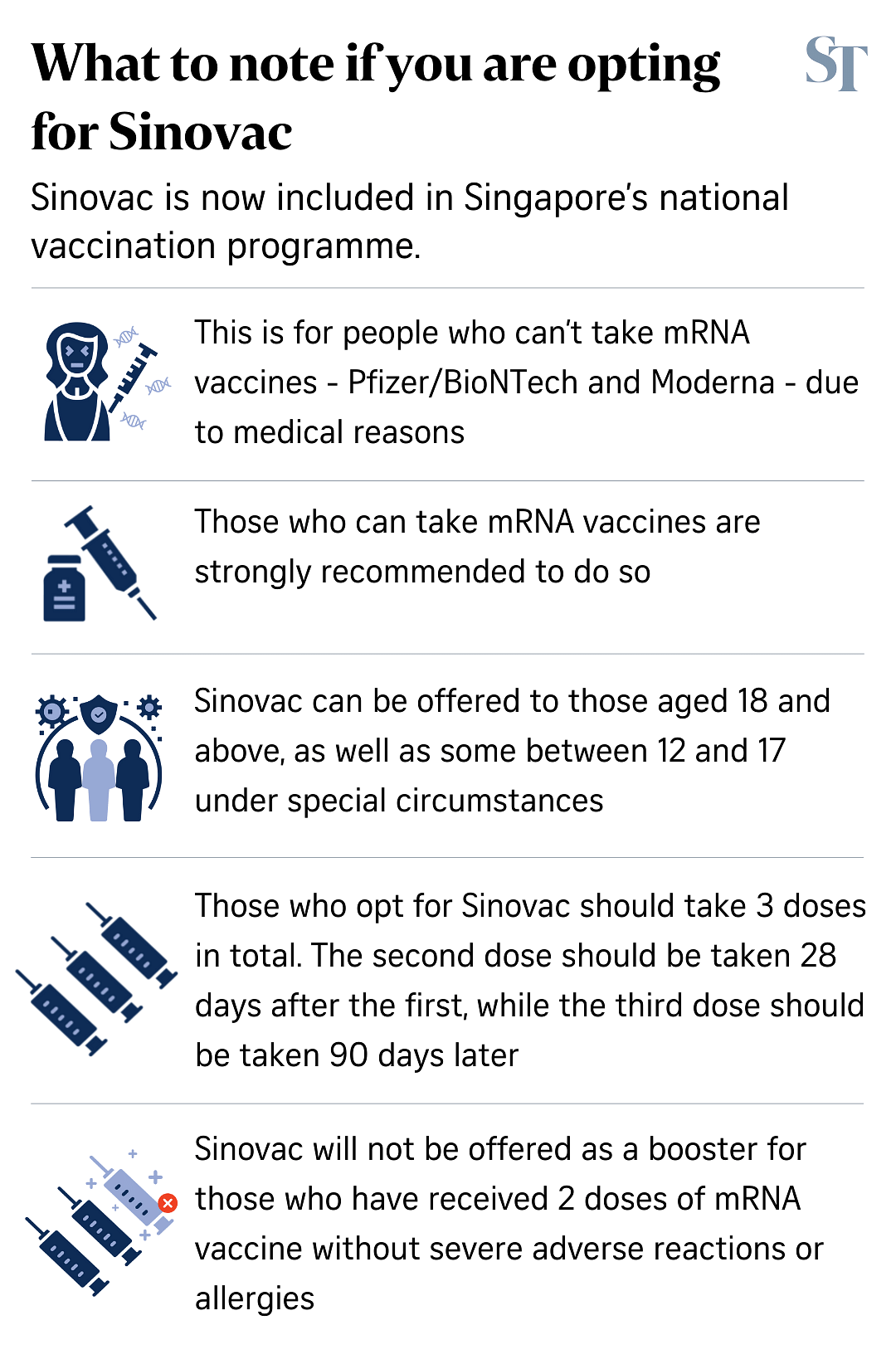SINGAPORE - Instead of a Freedom Day, which saw the near-complete lifting of measures in some countries, or a complete lockdown, Singapore has opted for a more calibrated approach in living with Covid-19.
Speaking on Saturday (Oct 23), Health Minister Ong Ye Kung said this means allowing some activities and putting restrictions on others.
"If we can take that approach, and live with some inconsistencies, then we can tackle the real challenge - which is how can we progressively reopen while keeping severe disease incidence rate and death rates as low as possible," he added.
To this end, Singapore is using three "brakes" to slow down the rate of infections and curb transmission of Covid-19 in Singapore: border restrictions, vaccinations and safe management measures.
Addressing concerns about the country opening up to international travellers, Mr Ong said border controls were important when Singapore had few local cases.
This was to avoid importing large numbers of individuals from countries that had high infection rates.
"The most common question I've come across is: Why are we reopening borders, yet not allowing larger groups for dining?
"This is because the brake of border control is no longer very relevant."
The situation has changed, he said.
After going through big transmission waves for many months, the pandemic situations in many countries have stabilised, the minister said, with the infection rates in some of them even lower than in Singapore.
"So we can open up travel lanes with these countries safely," said Mr Ong.
To make it safer, Singapore allows only travellers who are fully vaccinated, with pre-departure or on-arrival polymerase chain reaction (PCR) testing.
"This is why imported infection numbers are very low every day, and it's a very small fraction of total community infections."
He noted the benefits to the population in opening up Singapore.
"First, Singaporeans can travel for study, work or leisure, with their family.
"Second, we can start to bring in much needed workers to complete our Build-to-Order (BTO) projects to complete public infrastructure and other projects that we need," said Mr Ong, who was speaking at a press conference by the multi-ministry task force tackling the pandemic.
The minister noted that with the easing of border measures, the Ministry of Manpower (MOM) can start allowing in more domestic workers to relieve the stress faced by many families in Singapore.
To this end, Mr Ong said MOM will increase the entry of foreign domestic helpers from the current 200 a week to 1,000 a week.
Vaccinations and boosters
Mr Ong noted that around 20,000 individuals are taking their booster shots every day. Close to 660,000 individuals have taken their booster vaccination shots to date.
He added that 94 per cent of the population have either taken or booked their vaccinations slots.
Among the 6 per cent in the eligible population who remain unvaccinated, 70,000 are seniors.
"Some of these unvaccinated individuals are unable to take the mRNA vaccines due to medical reasons. Others may just simply prefer a non-mRNA vaccine.
"So we will make the Sinovac vaccine more accessible to them to encourage them to get vaccinated," said Mr Ong.
He added that the Ministry of Health (MOH) has decided to take the Sinovac vaccine under the national vaccination programme.
"The Sinovac vaccine will be administered as a three-dose vaccine. The second dose will be 28 days later, and third will be 90 days later," said Mr Ong.

Three doses of the Sinovac vaccine will be required for a person to be considered fully vaccinated, said MOH.
The minister noted that the changes will increase the demand for the Sinovac vaccine, and added that the ministry is in the process of securing more supplies for the specific usage.
The Sinovac vaccine, however, will not be used as boosters.
"For those who have already taken two doses of mRNA vaccines, the Expert Committee (on Covid-19 Vaccination) recommends, and MOH agrees, that they should receive either of the mRNA vaccines as boosters," said Mr Ong.
The Sinovac vaccine will not be used for children below 18 as the manufacturer did not provide safety or efficacy data for them.
For children between 12 and 17 years of age who may be allergic or develop a side effect to the mRNA vaccines, Mr Ong said MOH will be starting a separate dedicated public health programme for them.

Safe management measures
Mr Ong noted that some people feel that the rules do not seem to be consistent across settings.
"We understand everyone misses doing something they love, whether it is meeting friends, going to parties, playing sports or dining out... The businesses too want to do business properly, and not have to receive financial assistance. We share all these desires, and we will eventually get there."
He said the inconsistencies, and the confusion across settings, are difficult problems to solve.
"We know the extreme solutions are easy to understand... Freedom Day, where all restrictions are removed, or locked down, where everything is disallowed.
"Those are very easy to understand, very consistent. But both are not the outcomes, nor the solutions we want."
Mr Ong said Singapore is taking a middle path between the extremes.
He said the key is to protect the vulnerable, noting that 98.7 per cent of people infected today have mild or no symptoms.
"To protect the vulnerable, the most important aspect is to ensure hospitals are not overwhelmed. Then our health care workers can do their best to save lives."
The differentiated measures for the vaccinated and unvaccinated are very important, he added.
This is to help limit the exposure of unvaccinated individuals, especially seniors, to settings where they could be infected.
If this can be done successfully, then Singapore can progressively open up, with testing as a further layer of protection.

"Our approach is unique in the world. Most countries take either of the following two approaches - eradication or living with Covid. We did both.
"We implemented an eradication strategy last year and the last part of this year, when we were not protected by vaccines.
"A few months ago, after we vaccinated the large majority of our population, we moved to a living-with-Covid approach, but do it progressively step by step, not with a big bang," said Mr Ong.
He noted that many countries now live life quite normally.
But they took the living-with-Covid approach from the start and went through big waves of transmissions and suffered many deaths.
"They paid a big price. For countries such as the United States, Britain, Italy, Spain and France, the death rates there are about 2,000 deaths per million population.
"In places like Germany, Switzerland and Netherlands, it is about 1,000 deaths per million population."
In Malaysia, where Mr Ong said the situation is fast stabilising, it is over 800 deaths per million population.
"We are currently at about 50 deaths per million population, far lower than the rest.
"So we have so far given our people very strong protection, compared to many other countries in the world.
"But still, we mourn the loss of every life with their families and their loved ones and we cannot let up the fight," added Mr Ong.


